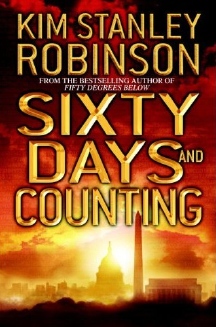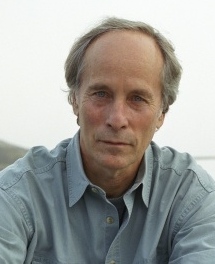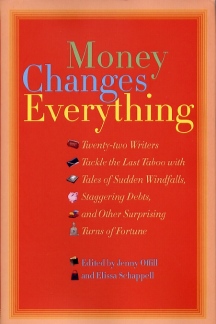Trashotron.com |
||
This Just In...News From The Agony Column
01-27-07: Weekend All Things Considered to Run On the Wings of Dragons Saturday, January 27, 2007
Tune in and Come Back for the URL
Weekend All Things Considered is going to run my report on dragons in SF&F fiction tonight, featuring my interviews with Anne & Todd McCaffrey, Naomi Novik, and Christopher Paolini. This will be the second story this month, thanks to your enthusiastic response to the story on Economic Genre Fiction. This is the URL to email the story; I now have a sort-of-OK MP3 of the broadcast.
01-26-07: Preview for Podcast Monday, January 29, 2007
Follow the Leader
I'm posting an MP3 preview audio trailer for Monday's podcast today, having made one for KUSP. I hope listeners enjoy this and will be tuned in for the upcoming podcast.
01-26-07: 'The Fair Folk' Edited by Marvin Kaye
Hover in the Fog and Filthy Air
Since my introduction to stories of faerie critters was Arthur Machen, I've always found them creepy. 'The White People' is easily one of the most frightening and disturbing stories I've ever read. But Machen is not the default setting. Neil Gaiman's 'Stardust', for example offers quite a bit of humor amidst the slightly distressing consequences of dabbling with the supernatural. As with any science fiction of supernatural trope, the faerie are an equal opportunity symbol, lending themselves to humor, romance, horror, suspense and morality tales.
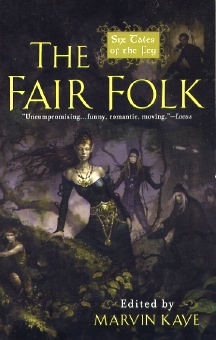
Not all your friendly fairies.
Marvin Kaye's 'The Fair Folk' (Ace / Berkeley / Penguin Putnam ; February 6, 2007 ; $15) is an anthology of stories that was originally published by the Science Fiction Book Club. The contents are good enough to make me want to look into the club if only to get the first edition hardcovers of titles as strong as this. Kaye is an ace editor who has brought together some pretty big names with a series of novelette and novella length stories that showcase the variety of moods writers can bring to the subject of the faerie.
Here's the rundown. Craig Shaw Gardener's "The Embarrassment of Elves" find the author working in his farcical mode with the latest tale of Ebenezum, the greatest mage (etc) but for the whole well, stumbling, bumbling thing. Gardener has an easy style and offers some nice barbs and satiric jabs amidst the slapstick goings-on. Meagan Lindholm, aka Robin Hobb, also works in the (non-slapstick) humorous mode with "Grace Notes", a contemporary fantasy about a clean-freak brownie who moves in with a slovenly machinist. Her style is more understated than Gardner's, so if silly doesn't suit you, then this might be a better fit. Jane Yolen and Midori Snyder offer a darker vision of magic exiled to the mundane in "Except the Queen". Tanith Lee's "UOUS" is a very clever twist on the old "be careful what you wish for / don’t make a deal with a fairy" theme that straddles darkness and laughter. Patricia A. McKillip's "The Kelpie" is probably not what you’d expect from this talented author, but it is what you might hope for, an arch alternate-Victorian tale of self-important artists who come into contact with a being that is surely beyond their comprehension. And of course, my favorite is Kim Newman's "The Gypsies in the Wood", a Charles Beauregard / Diogenes Club tale in which our favorite Newman hero finds himself confronting some very nasty critters.
As with Kaye's previous collection mentioned here, 'The Vampire Sextet', the quality is generally high and the variety is great. There's essentially something for everyone here and more than one high point for many tastes. Cap it all off with a nice little dictionary of faerie critters, with enough to intrigue but not overwhelm, and you've spent your fifteen bucks pretty wisely. Kaye is really onto something with these collections of novellas. I somehow managed to miss 'The Dragon Quintet', but I'm going to look it up and keep an eye out for the forthcoming collection 'The Ghost Quartet'. So, join the book club, get 'em used, what? As it happens, these Ace trade paperbacks are pretty nice. When Kaye has run through the fantasy tropes, might he be willing to start working in science fiction or dare I ask, mystery? Having read 'The Fair Folk', I'm at least well enough informed not to make any deals with pointy-eared smallish types to learn the future.
01-25-07: Kim Stanley Robinson Has 'Sixty Days and Counting'
The Future Now
Prescience is mostly a matter of luck. Mostly. But fortune favors the well prepared, and apparently nobody is better prepared than Kim Stanley Robinson. But his prep isn't just done in the realm of researching cutting-edge science, though he's clearly an ace at that. To my mind, Robinson's strong suit is the humanity that he emphasizes in his novels.
Sure, 'Sixty Days and Counting' (Bantam / Random House ; February 27, 2007 ; $25 ; Harper Collins UK ; April 2, 2007 ; £17.99), did have the whole "first 100 hours" thing of our new Congress covered long before any votes were tallied. But in Robinson's case, it's the new President who sets a deadline, and in this case it's to get things done vis a vis global warming. Does this sound like the day after tomorrow or what? Well, we can only hope so, and hope is a key element in Robinson's work. That, and humor, because these books are quite funny.
"I wanted to write a domestic comedy about global warming, it sounds odd but it’s true. And it was important to ground the whole project in the daily lives of ordinary people, not only because that’s what novels do, but because the problem itself concerns how ordinary Americans choose to live," Robinson told me about the series, which he calls Science in the Capital. "I began writing the first book in late 2001, and at that point “abrupt climate change” was a new concept, and the whole issue of global warming was much less emphasized than it is now. Some things I wrote about in an explanatory way (like FEMA, or carbon sequestration) are now well-known, and events are accelerating such that my various physical predictions are in some cases coming true (flooded coastal city, open-water Arctic Ocean, and most recently the inundation of an inhabited island in the Sundarbans)."
One could argue that the predictive nature of Robinson's work is the result of his interest in the every-day lives of his characters. But whatever the case, the result is that 'Sixty Days and Counting' and the entire Science in the Capital (not it is NOT an oxymoron!) series are entertaining and consummately well-written on a variety of levels. Sure, there's the page-turning eco-political thriller with all life on the planet hanging in the balance. Pretty high stakes. But equally important to the novels are the finely-tuned and very odd characters that Robinson creates. Readers watch Charlie Quibler play Mr. Mom until duty calls from a power no less than that of his friend, President Phil Chase. Frank Vanderwal's seriously odd love life involves a woman implicated in Presidential election fraud. The Quiblers and Vanderwal engage in bureaucratic infighting to get real science done to avert global catastrophe. Robinson offers passionate rants and inspired heights of invention that are both funny and thought-provoking.
The first two novels in the series, '40 Signs of Rain' and '50 Degrees Below', are required reading before one thinks about starting 'Sixty Days and Counting'. Science in the Capital really is a triptych novel, almost a serial. And should one wish to hear more from Mr. Robinson than the brief quote seen here, one can always listen to my 2004 interview and my 2005 interview (part 1 and part 2) with the author.
As science fiction, 'Sixty Days and Counting' and the entire Science in the Capital trilogy operate in a subtle and subversive manner. Robinson is gritty and realistic in portraying the day-today practice of science, but within these boundaries, he tosses off speculative notions that create a sense of wonder about the here and now. He explores our understanding of humans as social animals, small-scale, cutting-edge genetic engineering and huge-scale environmental amelioration with equal aplomb. But these speculations are embedded in scenes of domestic and workplace comedy.
01-24-07: Kay Kenyon Sees the 'Bright of the Sky' ; Richard Ford's 'The Lay of the Land'
Multiversal Appeal
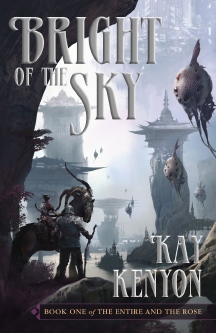
I'm guessing that this is Stephan Martiniere, but I may be wrong. Nice art. Sells me! I remember meeting Kay Kenyon at the 2002 Con Jose Worldcon and thinking that her careful world-building approach to science fiction was just the sort of thing that deserved much more than the mass-market paperback original format. Leave it to Pyr to pick up on that vibe and publish 'Bright of the Sky' (Pyr / Prometheus ; April 2007 ; $25). But there's more than just another novel from Pyr going on here.
As much as I like mass-market paperback originals, I do feel that the requirements of the format can be constricting to the writer, or at least they can feel constricting to the reader. If you know that a writer is going to immerse you in a new world, it's nice to see a book that is physically large enough to hold that new world in words. We can be assured that is the case with Kenyon's latest, because, a) the book is 458 pages long and b) it's a Pyr hardcover. Pyr makes great hardcovers with wonderful line leading (big spaces between lines) for easy reading.
But most importantly, Kay Kenyon has the talent and wherewithal to fill these pages with a fantastically conceived intricate world, where she can create human dramas that externalize a host of inner issues. And write a rousing multidimensional adventure. 'Bright of the Sky' is set in a milieu called the Universe entire. It's a land-locked galaxy that tunnels through our galaxy, if you can grok that concept. You'll need to take your multiple dimension pills to do so, but that's where the most delightful parts of this novel come from. Sure, you've got your wild, high-concept alien environment, where quasi-humans and aliens mingle tangled up in conflict and ruled by the Tarig. Not a nice bunch.
But what sets this novel apart is the fact that the Universe Entire riffs off the universe as we know it. Titus Quinn is a former star pilot from the good ol' space-faring Earth we know and love from every science fiction novel you've ever read about space-faring earth. He's in an agony of self torment because while everyone on earth believes his wife and daughter are dead, he believes them to be trapped in a parallel universe. He finds himself in the Entire, helped by and helping Anzi, of the Chalin, a Chinese culture lifted from our universe and copied into the Universe Entire, where it is transformed.
Kenyon's backdrop is as much a character as the people themselves, complicated and rich with motivations and a history that is mysterious and compelling. This is Big SF, filled with the sort of details that bring a world and the characters within to life, a sensawunda experience extraordinaire. Kenyon expertly creates her environment and peoples it with odd, menacing aliens and humans that have threads leading back to our world and our lives. Within Kenyon's universe, the story unfolds in a manner that is both internally consistent and yet externally relevant. It's also filled with the kind of thrilling set-pieces that make any novel memorable, the sort that play out nicely on the big screen in your brain.
At this point in her career, Kenyon has a nice batch of novels, but she's not a high-profile author. 'Bright of the Sky' is quite likely to change that. Remember Frank Herbert before 'Dune' and Roger Zelazny before 'Nine Princes in Amber'? Both were known and respected, but not yet the super-stars they would become. A single novel changed that for each of these writers. 'Bright of the Sky' finds Kenyon at a similar point in her career, and this novel could launch her to that level of notoriety, gain her notice outside the confines of genre fiction. She's got a zippy new website and blog where you can read excerpts from the novel. Or it could simply provide every single person who bought and read it with a superb reading experience. Great book production values, great cover and most importantly, lots of great prose devoted to an imaginative universe. No wait, make that universes. This goes well beyond world building.
'The Lay of the Land': An In-Depth Review
I know that many of my readers stop by this website to hear about genre fiction, and I like genre fiction a lot – because quite a bit of genre fiction is well-written. But I like to vary my reading as well, and few things are more enjoyable than a Richard Ford novel. He's hilariously funny, deeply insightful and ever a delight to read on all levels. I had the pleasure of speaking with him and if my review of 'The Lay of the Land' doesn't convince you to read the book, the interview should. He's a quintessentially American author, and he writes about my kind of people; suburbanites, those of us who willingly live in the cities clustered mostly on the east and west coast, those of us who hustle to the grocery store, work unpretentious jobs, who have wives and kids and mortgages and no small number of personal peccadilloes and quirks and obsessive behaviors, including our (my) ability to use the word Fuck with grace and precision. 'The Lay of the Land' deserves to be on many top-ten lists, which I've given up on. That said, I guess I have not entirely given up on them, it’s just that this year, it's a top ten list of one. Oh, I liked all the other books I read. This book, however, is a book I sort of lived. Even if you just stop by for the genre fiction, do yourself a favor, buy 'The Lay of the Land'. Just start reading, as I did, so many months ago. It is another world. It is our world.
01-23-07: Jenny Offill and Elissa Schappell Know that 'Money Changes Everything'
America Out of Balance
Like many Americans, my skills so far as money is concerned are rather out of balance. I'm great at spending, not so good at earning. This often creates what is generally known as a "negative cash flow". That's debt. Damn, if debt were a product, why I'd be the Wal Mart of debt. I'm a remarkably efficient debt-making machine. You add up a talent for talking to authors (which pays like, less than zero) and an appreciation for fine food, and mind-bogglingly expensive books, and well, they don’t add up. They subtract up, and thus the Wal Mart of debt comment. Oh, we make do. Toss in a kid in college? I'm swimming with cement overshoes.
Apparently Jenny Offill and Elissa Shappell thought Americans would enjoy having their faces rubbed in their own ineptitude. The result is 'Money Changes Everything' (Doubleday / Random House ; January 16, 2007 ; $24.95), subtitled, 'Twenty-two Writers Tackle the Last Taboo with Tales of Sudden Windfalls, Staggering Debts and Other Surprising Turns Of Fortune', a subtitle that is itself pretty staggering. No matter, these young ladies are definitely onto something. Whether or not money is "the last taboo", I would say that not enough is said about our fiscal unhealthy. Twenty-two writers manage to say quite a bit, say it well and turn in the surprise, dark-horse entry for best horror anthology of the year.
No, the HWA isn’t going to look at this, though to my mind, they should. For popular collections, these editors have a popular track record not a horror track record. Their last collaboration, 'The Friend Who Got Away' was about girly friendships, though it did get this jaw-dropper of a blurb from no less than the New York Times: "The Friend Who Got Away ... reveals women to be thoughtful and kind, sometimes callous and neglectful, like all humans."
No shit! They call that damn paper the Gray Lady for good reason. Women are human, you read it in the NYT first.
Move along, nothing to see here.
Back to this money deal.
Well, it changes everything. Again, this rises high on the no-shit-o-meter, but the twenty-two writers they’ve gathered here are pretty damn great, and no matter what financial stratum you belong to, you'll find the writing here consistently entertaining and insightful. Sure, the insights are probably thoughts that have flitted through all of our heads. But the expressions of those insights are remarkably enjoyable reading experiences. Charles D'Ambrosio muses on the fate of seven silver dollars, Chris Offutt talks about his father's work as a pornographer while Lydia Millet tells us about the 'Dirty Work' she did as the editor of Hustler magazine. Hey, I never saw that one in the want ads. Daniel "Lemony Snicket bazillionaire" Handler talks about spending the $1200 the publishers coughed up for his contribution to this very anthology on a bottle of wine. Salut!
I know they mean well, all of them. But let's do the math. 22 writers, $1200 max per writer. That's $26,400, assuming they paid everyone equitably. In point of fact, one wonders if they did, and thinks that investigative piece on how much it cost to put the book together might be an excellent article in and of itself. Let's presume some $5K for each of the editors. That brings it up to $36,400. Now, divide that by the price of the book, $24.95, and you get 1,458.92 people who need to buy it at full cover price just to bring in the amount it cost to create the book's software, so to speak. But the software (words) runs on that ever-dependable hardware platform (bound pages in a book). So let's just say, for the sake of argument, some 3,000 people need to buy this book. Seems possible. Does somebody feel the need to help Daniel Handler earn his bottle of wine? Now is your chance.
In fact, you may indeed have the chance to ask Handler himself for a sip. They're doing a bit of a tour to support this book, with stops in New York and Northern California. Capitola Book Café is handling one that includes a "TBA SF Contributor", whom I presume to be Handler. I could be wrong, but the event sounds like a hoot in any event. Both NY stops feature contributors. A great idea for a book, a great idea for a tour and you get this informed opinion from one who has spent (no pun intended) a great deal of time thinking about the intersection of fiscal reality and alternate realities.
'Money Changes Everything' may indeed not change everything it's own bad self. In fact, the best you can hope for, the best the authors can hope for, is that it changes the course of the readers' thoughts, and maybe that it succeeds in lifting the so-called taboo of money talk. It's quite clear why there's a taboo against talking about money. Those who have it are disinclined to fork it over to those who do not. Equity and labor be damned. If you've got yours, I can damn well bet that you'll not want to be getting even-steven with those whoa re fiscally other-abled than yourself. One thing money really brings out is the power of positive hypocrisy. I think there's a bestseller in there somewhere, a self-help book about unleashing your inner hypocrite. And you read that here first.
I'm off to pay the bills and balance the checkbook.
01-22-07: Eye-Biting, Funny or Horrific?
A 2007 Interview With Charlie Huston
Charlie Huston writes the kind of books that go down smooth and easy, like a cold beer on a hot day. Assuming of course, you can handle the staple-pulling, eyeball biting and non-stop use of the word "fuck". If the mere mention of these three items makes you want to giggle, if you like your noir so dark a flashlight isn’t worth shit, if you like your hard-boiled tough enough to dent a skull, then you've come to the right place. Huston writes what some might want to call white-knuckle thrillers, but the knuckles in this case are brass and the damage is seriously funny.
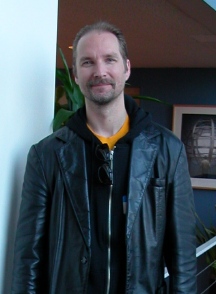
Not a childhood eyeball-biter.
I had the pleasure of speaking with Charlie again last week, and we had one hell of a good time over at KQED studios. Listeners to the podcast, who can download this NC-17 MP3 or the crippled by DRM RealAudio file, will get the unfiltered version of an interview that, when broadcast, will have more bleeps than a Kraftwerk song. Last week, when I podcast the Rucker, I got a couple of folks worried about my bandwidth taking these rather large MP3 files I generate. No worries folks! Please, please break the server! I'm happy to serve up these meaty files. I go to KQED, which is not free, to get the best possible sound that I can get. I make larger, higher bandwidth MP3 files because I want listeners to get the most transparent sound. I've also been hellaciously busy, so I' haven’t had a chance to answer the coupe of folks who wrote, but I will try to get back to you as things calm down a bit this week.
That said, Huston is a one-hundred percent hoot. We had a great time talking about his noir roots, and the reasons his work is so bloody. You can also find out once and for all if the whole eyeball-biting bit is funny or not. Regardless of what Huston thinks, your reaction to his over-the-top violence and foul language probably tell you more about yourself than Huston.
Look, Huston's books are the sort of thing one reads purely for the fun of it. I really look forward to every new novel he puts out. At this point there are five; the Hank Thompson trilogy, which includes 'Caught Stealing' (cat torture), 'Six Bad Things' (not sure yet), and 'A Dangerous Man' (fuckin' ditto), and the Joe Pitt Casebooks, which include 'Already Dead' ("gruesome quadruple homicide") and 'No Dominion' (eyeball biting). These are fun books to read, if you find reading about violence so insane you just can't help but laugh. Well, I just can't help but laugh. But then, that's me and there is probably something demonstrably wrong with me. Still, I know a good novel when I read one, even if the baseball bat only gets used for its intended purpose once. Hey, that's good enough. They were after all clubs before they were baseball bats.
